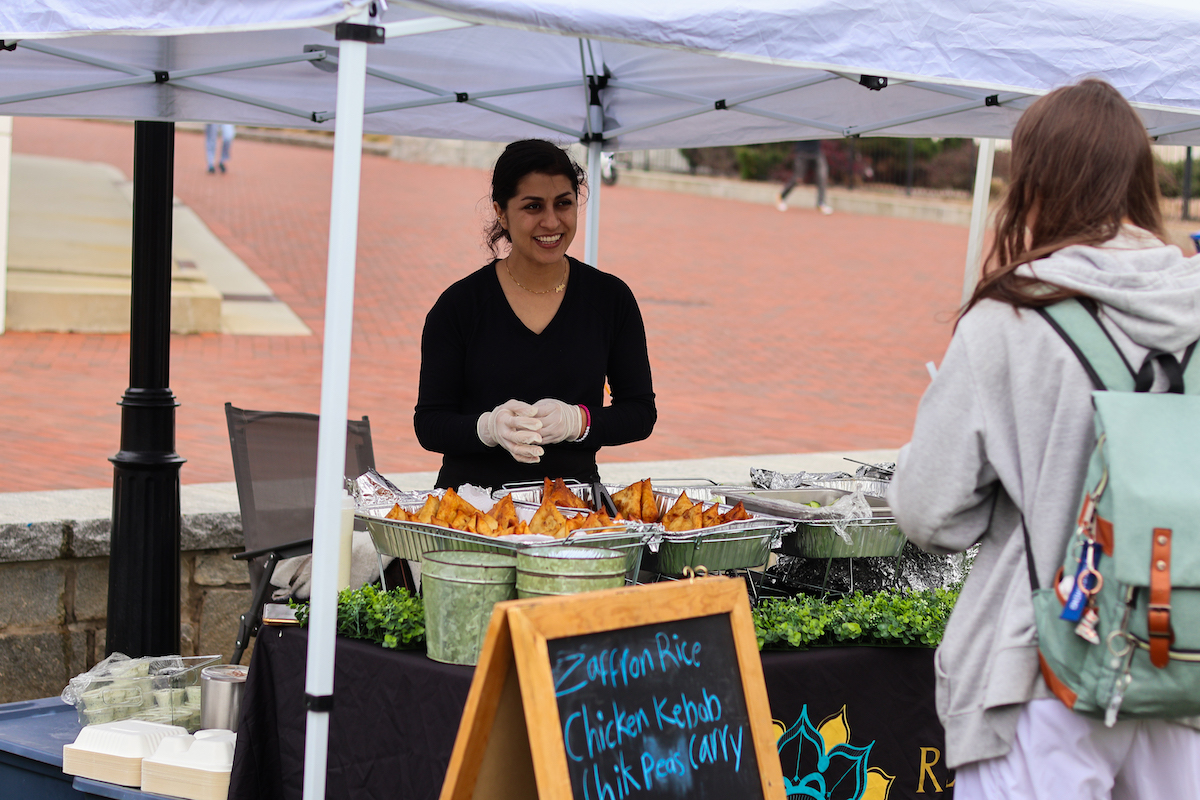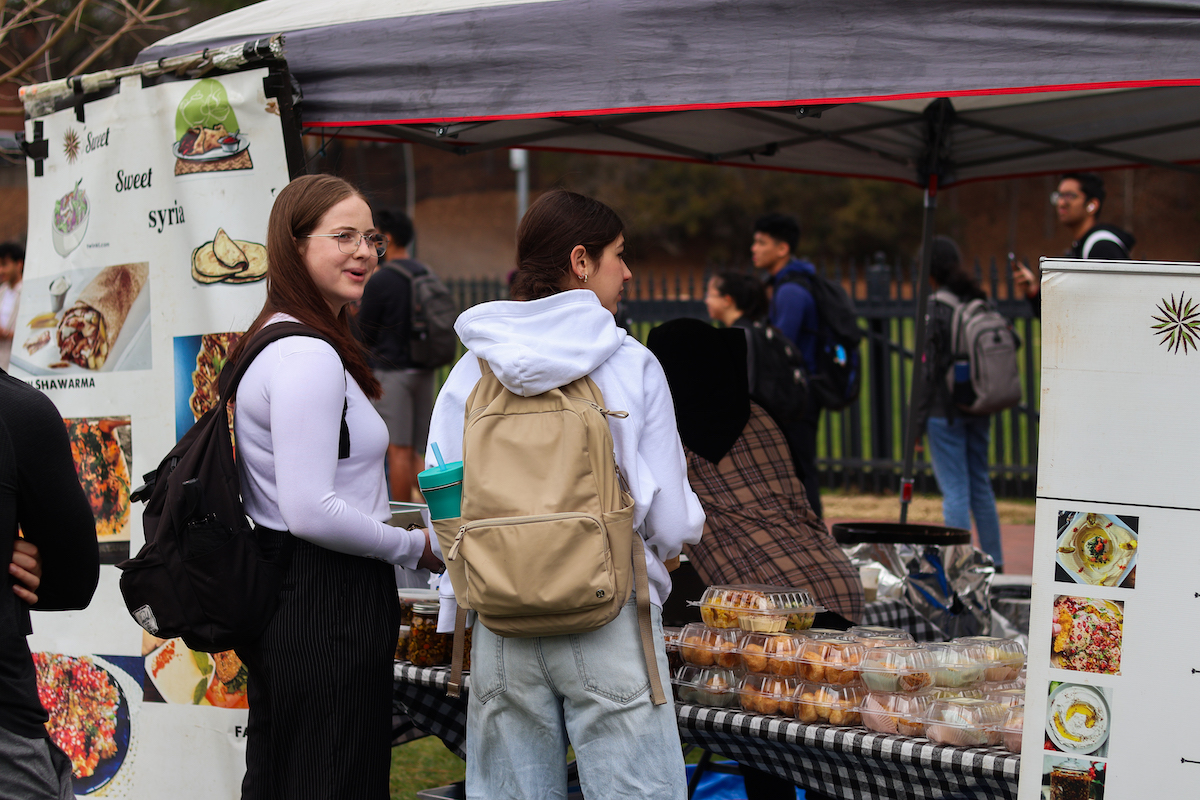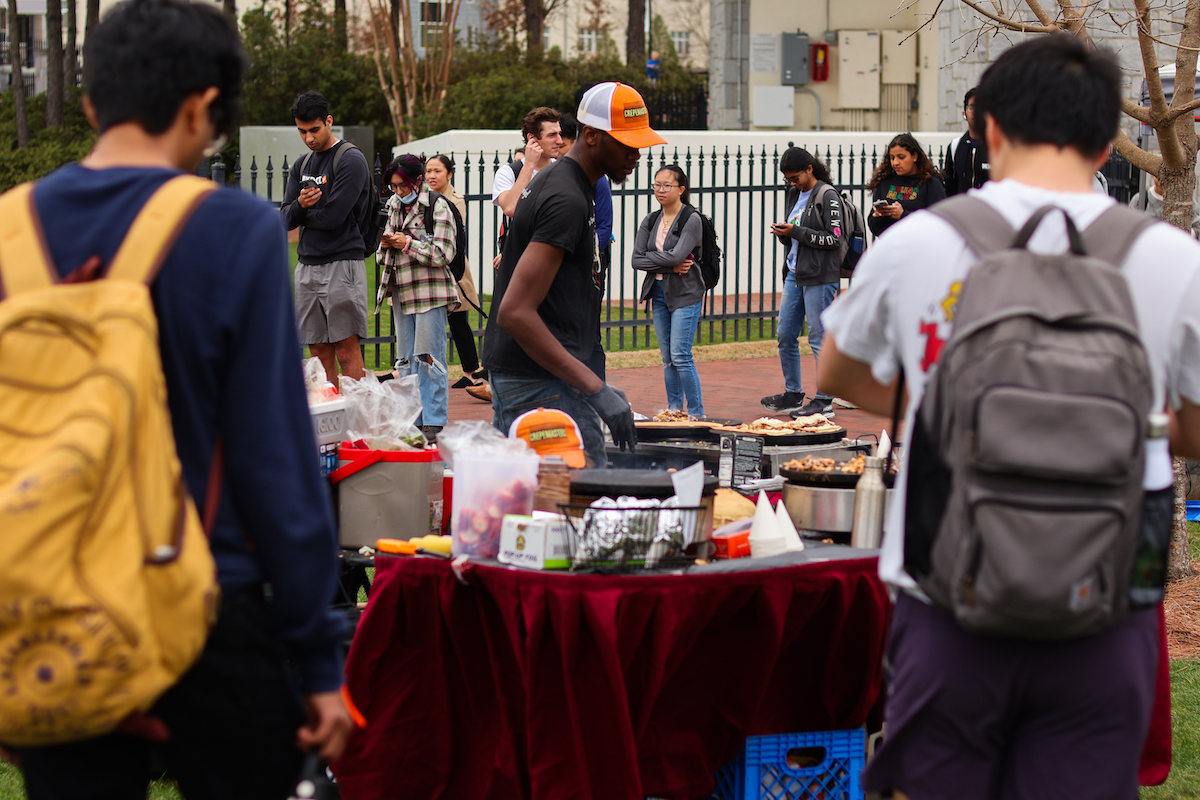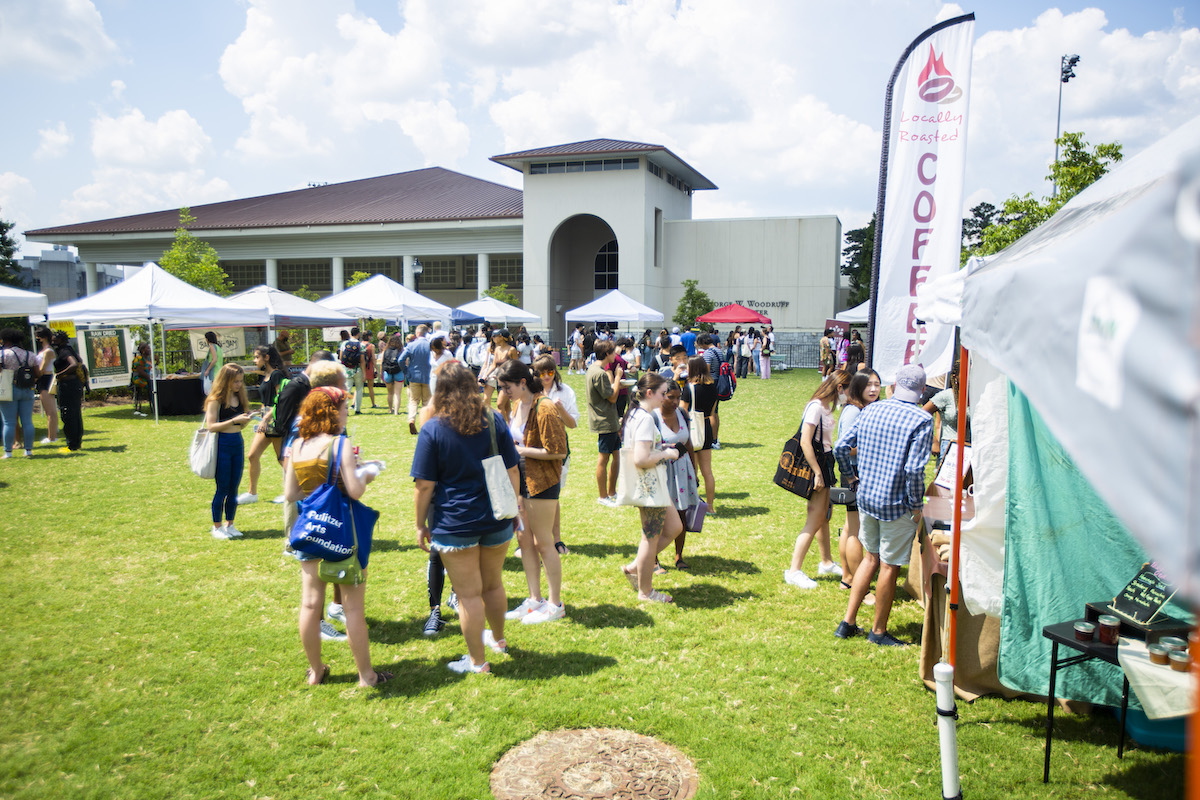If you stroll through McDonough Plaza on most Tuesday afternoons, you’ll no doubt be enticed by the Emory Farmers Market, with chatter among friends, the smells of food and a draw to be where the action is around campus. Seeing all the vendors and attendees, you might consider it just that: a popular event to bring food to the Emory community on campus.
But the farmers market is much more than that. It is a place for sustainability education and efforts that impact the local community, state and beyond.
“The farmers market is a place of gathering and community,” says Mark Seals II, associate director of campus dining at Emory. “We’re also really focused on Emory’s mission and vision for sustainability, particularly when it comes to food and local sourcing.”
A food-centered community
The Emory Farmers Market happens every Tuesday at 11 a.m. during academic semesters and biweekly during the summer. Each event features a variety of products that appeal to every taste of Emory community members.
Farms, restaurants and small-scale artisanal businesses are represented at the market, featuring everything from baked bread and honey to coffee, hot food options and fresh vegetables from the Oxford Organic Farm.
Some vendors, like Legacy Bakers — a husband-and-wife duo that sells a variety of pastries, pound cakes and biscotti — have been market staples for nearly 10 years.
“Legacy Bakers has a strong connection with our Emory community,” says Kendra Ding, sustainability and social justice fellow in the Office of Sustainability Initiatives (OSI). “One of their children attended Emory School of Medicine and completed his residency here in radiology. And some of the older customers they had at the market who graduated from Emory came back to them to make cookies for their wedding. We love seeing those kinds of connections.”
The variety appeals to everyone on campus, according to Ding. Staff and faculty tend to favor fresh produce while students prefer hot food, including Cuban, Syrian and Moroccan cuisines. Students are invited to use Eagle and Dooley Dollars to purchase items at the market.
“At least two of the five hot food vendors will be sold out by the end of the market,” Ding observes.
Though the Emory Farmers Market only happens once a week, planning is a year-round endeavor undertaken by Ding, Seals and Liz Carlino, assistant director of campus dining. The trio, along with other leaders in OSI and Emory Dining, processes vendor applications, coordinates logistics for each market and serves as the first point of contact for everything market related.
The market is also supported by a subcommittee of staff, faculty and students across campus that review the previous year’s markets and consider what new vendors could be included.
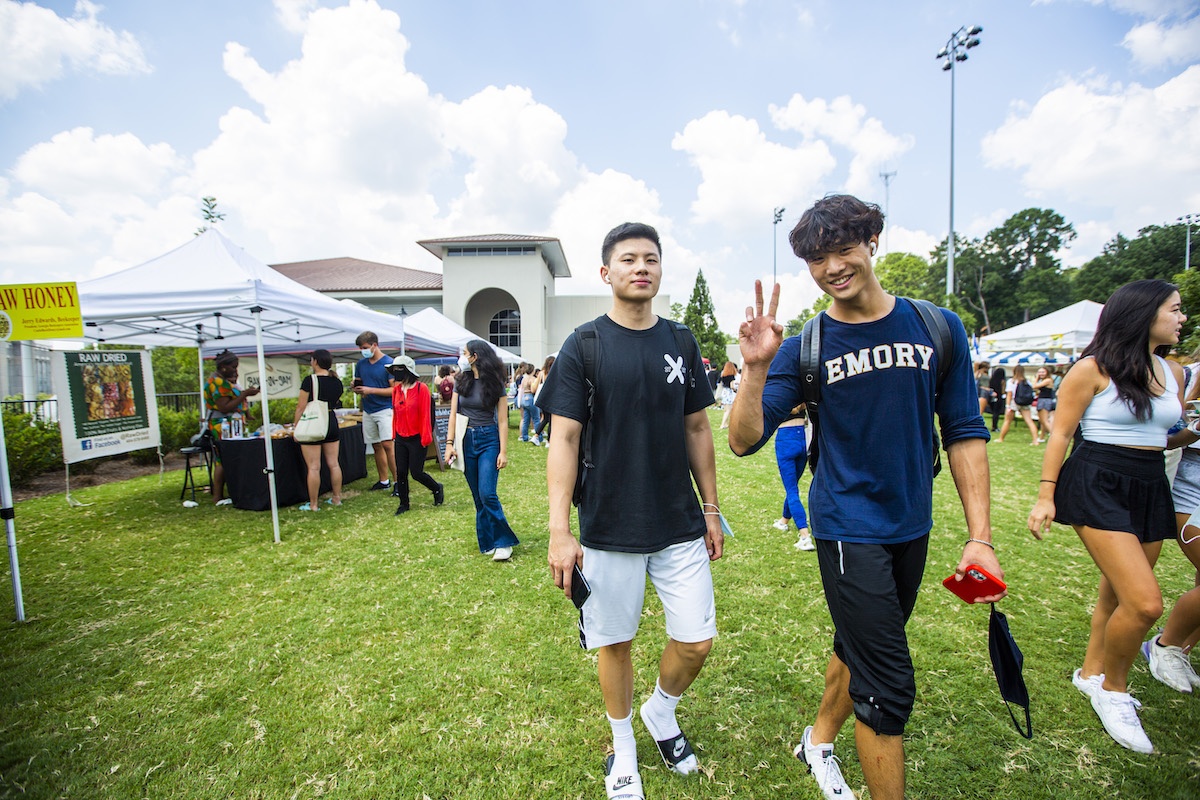
Students, faculty and staff enjoy fresh produce, hot food and artisanal goods in McDonough Plaza at the Emory Farmers Market on Tuesdays.
More than just selling food
Though the market boasts some of the best food, produce and artisanal goods options in the neighborhood — even recently being named one of the best farmers markets in Atlanta — the minds behind the market want it to be a place of education.
This goal is integrated in several ways, including on-site cooking demonstrations and an educational table. Every month, a different campus group purchases seasonal market produce and creates a dish using those ingredients. Free samples of the delicious results are shares with attendees.
“The dish is always something easy, something practical and something that an average Emory student would be able to duplicate in their dorm room or shared kitchen,” says Seals.
“It’s a better way of engaging our community with cooking with more seasonal ingredients instead of going to large grocery stores and buying, for example, blueberries year-round, even when they’re out of season,” says Ding.
At the educational table, attendees can learn about food security resources on campus, seasonal produce and more. Student organizations are also invited to participate by showcasing on related topics. In the spring, for example, Emory’s Asian Student Organization participated in a tabling event.
“People talked about the Asian cultural background, for instance, about how to make matcha, or planting Thai basils,” says Ding, who manages the educational table. “There are exciting events and perspectives going on at the table.”
And of course, there’s always something to learn by interacting with the community.
“We bring people together to showcase local and sustainable businesses. We teach them things like produce usage, where produce comes from and the processes of these small businesses and local farmers,” says Seals.
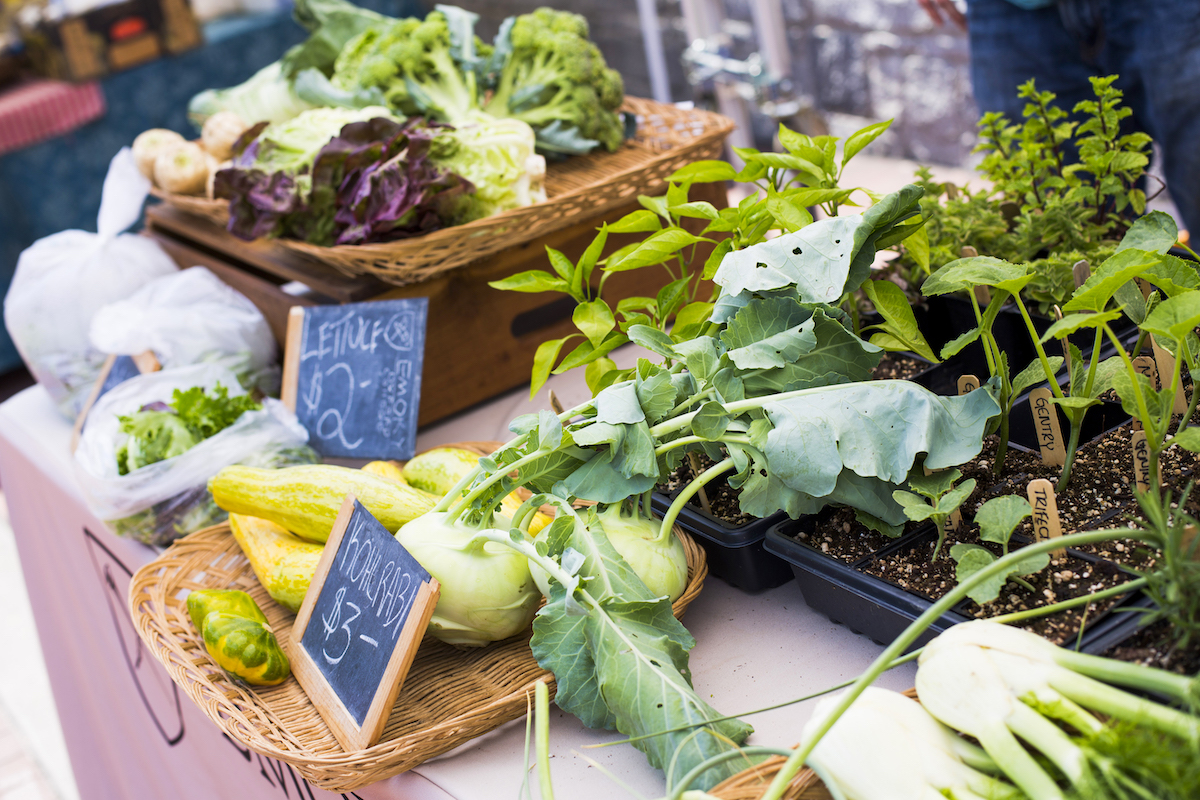
The Emory Farmers Market offers a variety of fresh produce for purchase. Groups often use the produce in cooking demos to showcase easy, affordable meals.
How is food connected to sustainability, anyway?
It’s an easy question with a multifaceted answer to explore: How are food and sustainability related?
In short, food is connected to sustainability in every way — there is an interconnected web of considerations when thinking about how food impacts sustainability efforts.
“Transporting food, ingredients or finished products has a huge impact on the environment,” says Carlino. “The miles that food is transported is something we don't always think about, but has a massive environmental impact. The longer food travels, the higher the greenhouse gas emissions. Where your food is coming from is so crucial. You could be choosing all healthy foods, and yet, if that food has to travel hundreds of miles and be packed in coolers, what is the actual benefit?”
This is why Carlino and others within the farmers market emphasize the importance of buying in-season food from local sources. The less distance a product travels, the better it is for the environment.
When the produce at the Emory Farmers Market comes from the Oxford Organic Farm, for example, it travels just 40 minutes. Some of the vendors at the market source nearly 50% of their products locally, according to Seals.
Another consideration for buying products: Are producers being paid fairly?
“The Farmer's Market is a prime example of how we can support local small businesses and farms. When we buy local, we are not just supporting those small business owners, but also their employees and other local establishments that they utilize. Instead of spending money on large corporations who may not have the Emory community in mind, we are lifting up our own community and neighbors,” says Carlino.
Waste and trash are also critical considerations when it comes to food distribution and consumer products. The market’s low-waste commitment reflects Emory’s larger sustainability framework.
In fall 2022, the market eliminated plastic bags and Styrofoam, requiring vendors to use alternative containers for food distribution and encouraging attendees to bring a reusable bag. Vendors must meet additional requirements to be involved in the market, such as sourcing sustainably and locally.
“We want to be a champion at the heart of main campus for our waste policies,” says Ding.
A reflection of campus attitudes
The Emory Farmers Market has been going strong since 2008 — except for a brief hiatus due to COVID-19 — which is a testament to the campus community’s values. According to Seals, it shows how much the Emory community cares about how people are affected by food purchases, the environment and sustainability.
“As part of the Emory community, sustainability is part of our fabric. It’s who we are in showing that we care,” Seals explains. “It says that Emory is a giving community that thinks not only of themselves but also of the impact they can have on others.”
Carlino hopes that the knowledge and experiences gained from the farmers market will carry forward.
“We hope to expand on all these commitments and serve as a small window of what’s possible. Our goal is to give folks the tools to make healthier decisions for themselves and the environment that will transcend food purchases and spread to other aspects of their lives,” says Carlino.
The Emory Farmers Market is open to everyone in the surrounding community. For more details and updates, follow @EmoryFarmersMkt on Instagram or check out their page on the Office of Sustainability Initiatives website.

